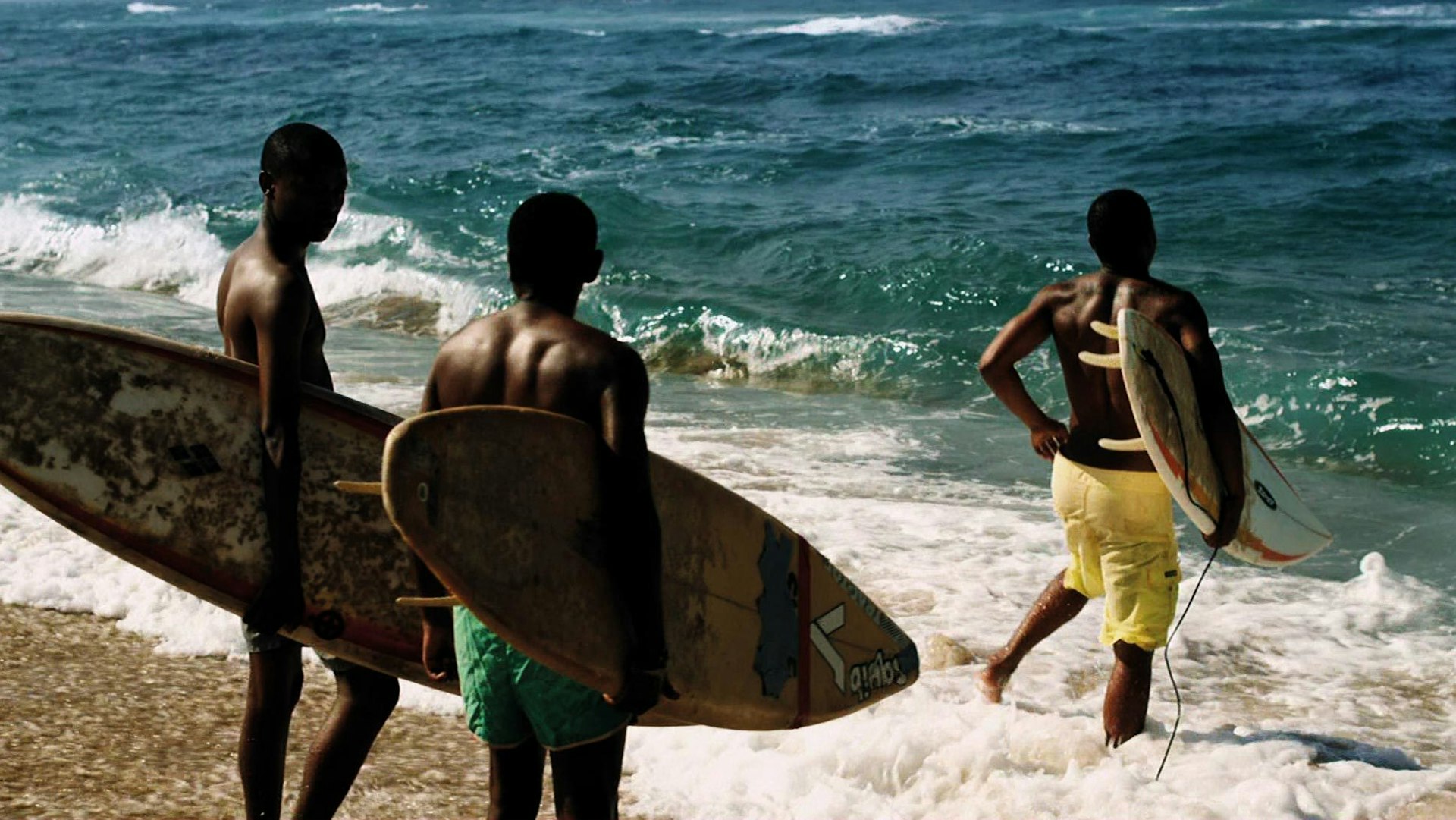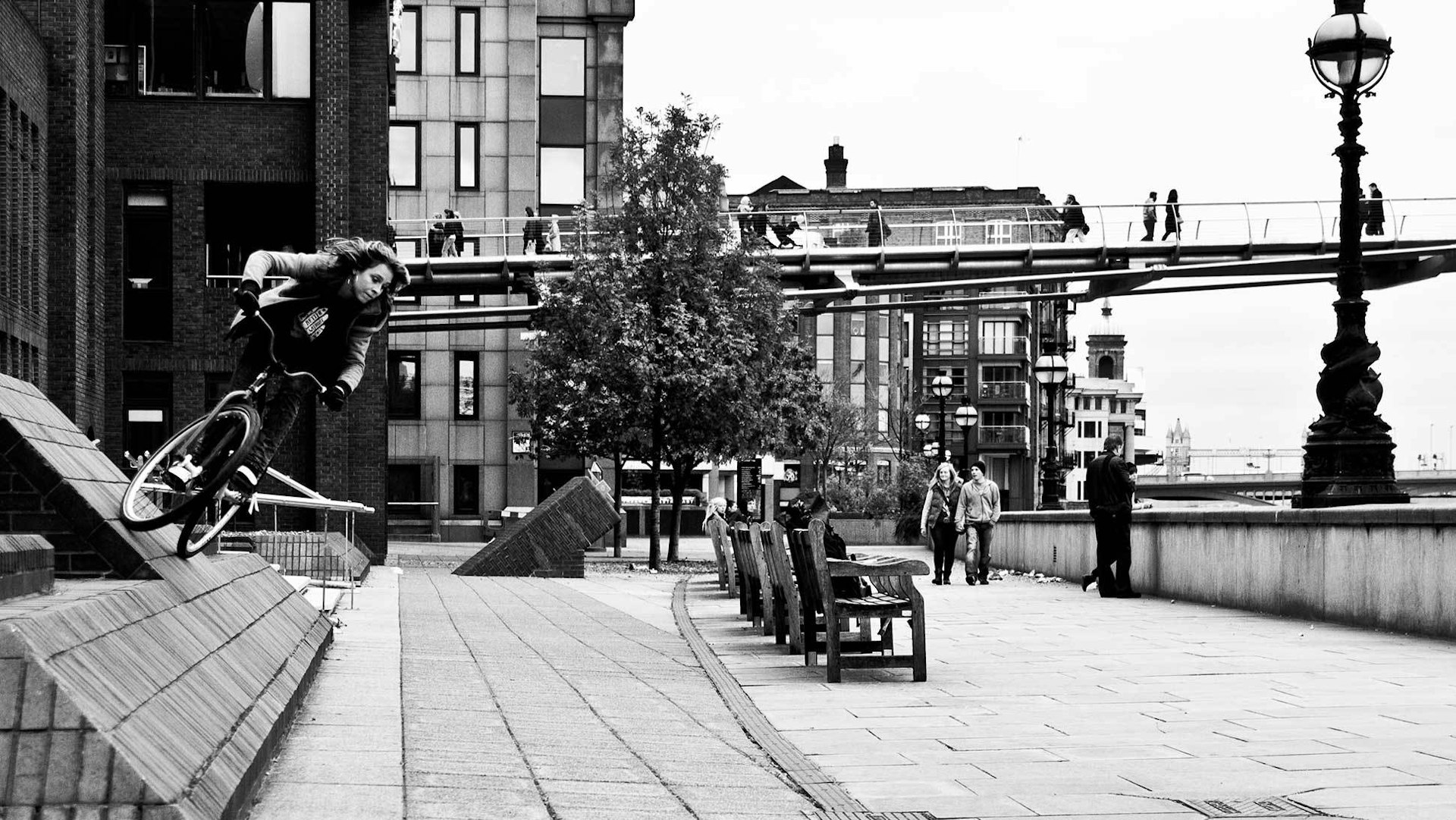
Otelo Burning
- Text by Rob Boffard
- Photography by Anita Van Hammert
It had been a long time since Sara Blecher had visited Durban when she found herself returning there in 2004. She’d lived in the coastal city before, but had spent the past few years in Johannesburg, working as a producer on the South African current affairs programme Special Assignment. Had the brutal Apartheid regime still been in place, the city’s beaches would have brandished signs in Afrikaans reading ‘slegs blankes’ – ‘whites only’. But as she walked along the sand on that first trip back, Blecher marvelled at how much the crowd had changed.
“Suddenly the entire Durban beachfront had gone from being absolutely white to absolutely black,” Blecher recalls down the phone from her Jo’burg home. “The lifeguards went from being white tattooed surfers to being these young, cool black tattooed guys.”
She soon fell into conversation with a muscular guy who introduced himself as Sihle Xaba. Xaba mentioned that almost all the lifeguards on the beach came from one place: Lamontville, a township south of the city, huddled in the shadow of the airport. Intrigued, Blecher wanted to know more.
Xaba took her back to the township. And as he introduced her to his friends and family, as they sat drinking beers in the local shebeen, a tiny seed of an idea was planted in Blecher’s mind. This year, that idea burst into full bloom, in the form of new film Otelo Burning.
Directed by Blecher and made entirely in Zulu, the film is set in 1989 and tells the story of two young black men from Lamontville named Otelo and New Year. The friends discover that surfing can help them escape the horrific political violence swirling around their lives.
Across the country, the Apartheid state was brutal when it came to cracking down on resistance. KwaZulu Natal (the province where the film is set) was still known simply as Natal – dismissing the Zulu nation’s roots – and it faced a particularly nasty additional problem. Black-on-black violence was flaring up: supporters of the African National Congress (ANC), Mandela’s party, were clashing with those of the more conservative Inkatha Freedom Party (IFP), with often fatal consequences.
Imagine having a tire placed over your head, being doused with petrol and set alight. It was called necklacing, and in 1989 Lamontville got it bad. The township was the centre of a dispute over being incorporated into one of the state’s black ‘homelands’ – a move which the IFP supported, but the ANC didn’t. For residents that meant a day-to-day existence pockmarked with necklacings, beatings, petrol bombs – and the constant grind of dealing with Apartheid itself. There’s a historical argument that South Africa never suffered a real civil war, but if that’s the case, then Lamontville is about as close as it got.
Otelo Burning is fiction. But the stories it’s based on are not. What Blecher and her new friends found between 2004 and now gets right under the skin of South African society. It shows just how powerful the pull of surfing can be, and what it can achieve.
Xaba himself stars as the treacherous Mandla, whose jealousy threatens to tear apart the boys’ newfound freedom. And one of the people Xaba introduced Blecher to, as they walked around Lamontville, was a man named Sthembiso Madiya. He worked at the township’s pool where Xaba learnt to swim. “Essentially, that swimming pool is the only pool in any of the townships that remained open during [Apartheid],” says Blecher. “With most of the pools, the gangsters came and occupied them. The pools they didn’t take over were destroyed by the [freedom fighters], because they were seen as symbols of the Apartheid state. They were run by the government. While the kids were burning down libraries and schools, they burned down the pools, too. But that pool remained open.”
Madiya was working at the pool when a group of heavily armed men arrived. “They came to the pool, pulled a gun on him, and he didn’t flinch,” Blecher explains. “The guy pulled the trigger, and the gun jammed. And from then on, the story spread in the township that he was bulletproof. Nobody ever messed with him ever again.”
Out of Madiya’s resolve, Lamontville fostered a generation of young black swimmers and surfers. Xaba himself is one of them – outside of his acting career, he is a South African bodyboarding champion.
Blecher began to hang out in Lamontville regularly, earning the trust of the community. She applied for grant money from the government, and held acting workshops in the township where anybody was free to turn up and develop scenes from their experiences of the Apartheid years. Slowly, the structure of Otelo Burning began to form.
It wasn’t easy. Asked why this level of dedication is a rarity among filmmakers, Blecher laughs: “It’s ridiculously expensive and it takes eight years! It’s a long, laborious process. But I think when you watch the movie, you feel like you’re watching a documentary. You get such incredible detail out of those workshop processes, and such deep layers of honesty.”
Thomas Gumede, who plays Otelo’s best friend New Year, believes the film benefits from the fact that anyone could step forward and share their experience. “It’s almost the perfect model of how to shoot a film,” he says. “They had to make it dramatic for the purposes of the film, and add in love and drama and murder, but it was a collaborative effort. Sara and I were based in Joburg together, so it was easy for us to sit down and work on the script.”
Blecher seems to have a penchant for digging up these kinds of stories. Her previous film, Surfing Soweto, looks at the ‘sport’ of standing on the top of train carriages as they speed through the city. But although her films seem to focus on adrenalin-fuelled pursuits, Blecher says it’s about more than that.
“It’s not about sport and society as much as it is about coming of age and politics,” she says. “There is such a parallel in South Africa between young men coming of age, and what’s going on in this country politically. I know that sounds bizarre, but it feels like this country is coming of age, and going through that passage. Surfing Soweto and Otelo Burning – both movies are about that transition from boyhood to manhood.”
